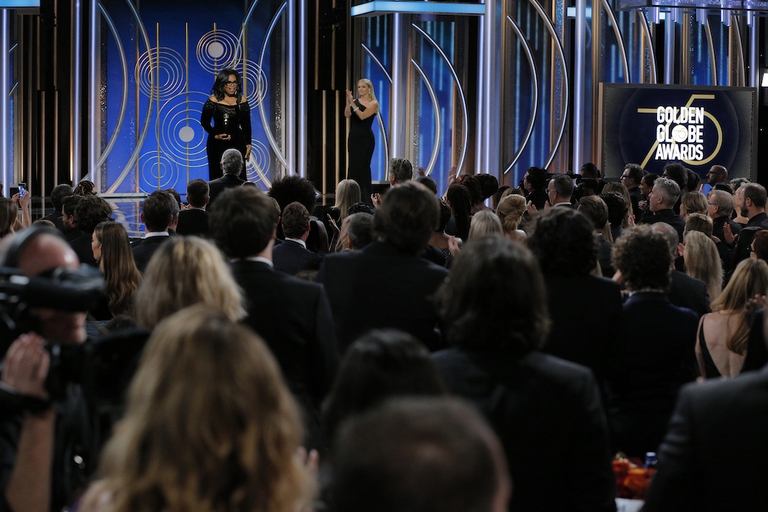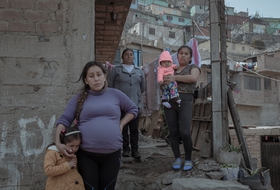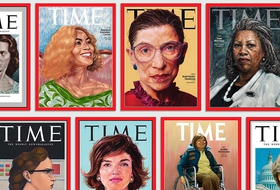
One in three women have suffered physical or sexual violence. With contributions from Europe, Africa, Asia and Latin America, we look at how this shadow pandemic affects every corner of the world.
All eyes were on Oprah Winfrey at this year’s Golden Globe Awards. Her speech made waves by highlighting the struggle of too many women against a violent, male-dominated culture. The video and transcript in full.
https://youtu.be/fN5HV79_8B8
Oprah Winfrey, American actress and TV personality, took the stage at the 75th Golden Globe Awards ceremony held in Beverly Hills, in the US state of California, on 7 January to accept the Cecil B. deMille award, in which the Hollywood Foreign Press Association honours “outstanding contributions to the world of entertainment” – the first black woman to receive this recognition. Like others that night she took the opportunity to draw attention to the sexual harassment scandals that have rocked the entertainment industry set off by the Harvey Weinstein case, which has seen the historic Hollywood producer accused of molesting dozens of women over the course of his decades-long career, and which has seen other male personalities face similar accusations.
Read more: #MeToo campaign’s silence breakers, who spoke out against sexual violence, are Time Person of the Year 2017
Here to present our final award of the night is someone who needs no introduction… @BarbraStreisand! She introduces the nominees for Best Motion Picture – Drama. #GoldenGlobes pic.twitter.com/Q946KYUjvH
— Golden Globe Awards (@goldenglobes) 8 gennaio 2018
In her speech, Winfrey traced her own story as well as that of the struggle for women’s rights in the country. She offered a message of hope that the future will look different from such a difficult past thanks to movements such as the #MeToo social media campaign in which victims have spoken out about their experiences of sexual violence, the “silence breakers” who were chosen by Time Magazine as Person of the Year 2017.
“In 1964, I was a little girl sitting on the linoleum floor of my mother’s house in Milwaukee watching Anne Bancroft present the Oscar for best actor at the 36th Academy Awards. She opened the envelope and said five words that literally made history: ‘The winner is Sidney Poitier’. Up to the stage came the most elegant man I had ever seen. I remember his tie was white, and of course his skin was black, and I had never seen a black man being celebrated like that. I tried many, many times to explain what a moment like that means to a little girl, a kid watching from the cheap seats as my mom came through the door bone tired from cleaning other people’s houses. But all I can do is quote and say that the explanation in Sidney’s performance in Lilies of the Field: ‘Amen, amen, amen, amen’.
In 1982, Sidney received the Cecil B. DeMille award right here at the Golden Globes and it isn’t lost on me that at this moment, there are some little girls watching as I become the first black woman to be given this same award. It is an honour and a privilege to share the evening with all of them and also with the incredible men and women who have inspired me, who challenged me, who sustained me and made my journey to this stage possible. Dennis Swanson who took a chance on me for A.M. Chicago. Quincy Jones who saw me on that show and said to Steven Spielberg, ‘Yes, she is Sophia in The Color Purple’. Gayle who has been the definition of what a friend is, and Stedman who has been my rock – just a few to name.
Read more: The global gender gap, the 2017 report shows that disparity has increased for the first time in a decade
I want to thank the Hollywood Foreign Press Association because we all know the press is under siege these days. We also know it’s the insatiable dedication to uncovering the absolute truth that keeps us from turning a blind eye to corruption and to injustice. To tyrants and victims, and secrets and lies. I want to say that I value the press more than ever before as we try to navigate these complicated times, which brings me to this: what I know for sure is that speaking your truth is the most powerful tool we all have. And I’m especially proud and inspired by all the women who have felt strong enough and empowered enough to speak up and share their personal stories. Each of us in this room are celebrated because of the stories that we tell and this year we became the story.
But it’s not just a story affecting the entertainment industry. It’s one that transcends any culture, geography, race, religion, politics or workplace. So I want tonight to express gratitude to all the women who have endured years of abuse and assault because they, like my mother, had children to feed and bills to pay and dreams to pursue. They’re the women whose names we’ll never know. They’re domestic workers and farm workers. They’re working in factories and they work in restaurants and they’re in academia, engineering, medicine and science. They’re part of the world of tech and politics and business. They’re our athletes in the Olympics and they’re our soldiers in the military.
And there’s someone else, Recy Taylor, a name I know and I think you should know, too. In 1944, Recy Taylor was a young wife and mother walking home from a church service she’d attended in Abbeville, Alabama, when she was abducted by six armed white men, raped and left blindfolded by the side of the road coming home from church. They threatened to kill her if she ever told anyone, but her story was reported to the NAACP where a young worker by the name of Rosa Parks became the lead investigator on her case and together they sought justice. But justice wasn’t an option in the era of Jim Crow. The men who tried to destroy her were never persecuted. Recy Taylor died ten days ago, just shy of her 98th birthday. She lived as we all have lived, too many years in a culture broken by brutally powerful men. For too long, women haven’t been heard or believed if they dare speak the truth to the power of those men. But their time is up. Their time is up.
Their time is up. And I just hope that Recy Taylor died knowing that her truth, like the truth of so many other women who were tormented in those years, and even now tormented, goes marching on. It was somewhere in Rosa Parks’ heart almost 11 years later, when she made the decision to stay seated on that bus in Montgomery, and it’s here with every woman who chooses to say, ‘Me too’. And every man who chooses to listen.
In my career, what I’ve always tried my best to do, whether on television or through film, is to say something about how men and women really behave. To say how we experience shame, how we love and how we rage, how we fail, how we retreat, persevere and how we overcome. I’ve interviewed and portrayed people who’ve withstood some of the ugliest things life can throw at you, but the one quality all of them seem to share is an ability to maintain hope for a brighter morning, even during our darkest nights. So I want all the girls watching here, now, to know that a new day is on the horizon! And when that new day finally dawns, it’ll be because of a lot of magnificent women, many of whom are right here in this room tonight and some pretty phenomenal men, fighting hard to make sure that they become the leaders who take us to the time when nobody ever has to say ‘Me too’ again.”
Siamo anche su WhatsApp. Segui il canale ufficiale LifeGate per restare aggiornata, aggiornato sulle ultime notizie e sulle nostre attività.
![]()
Quest'opera è distribuita con Licenza Creative Commons Attribuzione - Non commerciale - Non opere derivate 4.0 Internazionale.
One in three women have suffered physical or sexual violence. With contributions from Europe, Africa, Asia and Latin America, we look at how this shadow pandemic affects every corner of the world.
The Istanbul Convention against gender-based and domestic violence marks its tenth anniversary. We look at what it is, who its signatories are, and what the future might hold.
European Commission President Ursula von der Leyen reminded us of the gravity of violence against women around the world, and of the Istanbul Convention’s utmost importance.
President Erdoğan has pulled Turkey out of the Istanbul Convention, key in the fight against gender violence, claiming that it favours the LGBT community rather than family values.
Violence against women in Peru has increased as a result of Covid-19 lockdowns. 14,912 people were reported missing from January to November 2020, more than half of them minors and 64 per cent women. People have been confined to their homes for months, many forced to endure poor physical, economic and social conditions. A situation that
Joys Estefani Qqueccaño Huamani, 24, disappeared from her rural community in Peru on 9 October. Her family began looking for her independently of the authorities and despite the resistance of relatives of Joys Estefani’s ex-partner Arturo Ccana Condori, 32, charged with committing violence against her on 28 September, eleven days before Joys Estefani disappeared. Photos
Costa Rica celebrated its first same-sex marriage when two women, Alexandra Quiros and Dunia Araya, celebrated their wedding: an “extraordinary moment”.
The pandemic and its restrictions are affecting everyone, without exceptions. However factors like housing, income inequalities, gender, access to technology and working conditions are influencing how people experience the health crisis.
Time magazine’s 100 Women of the Year project sheds light on influential women’s stories, from Amelia Earhart to Greta Thunberg. A selection of some of the greats for International Women’s Day.








